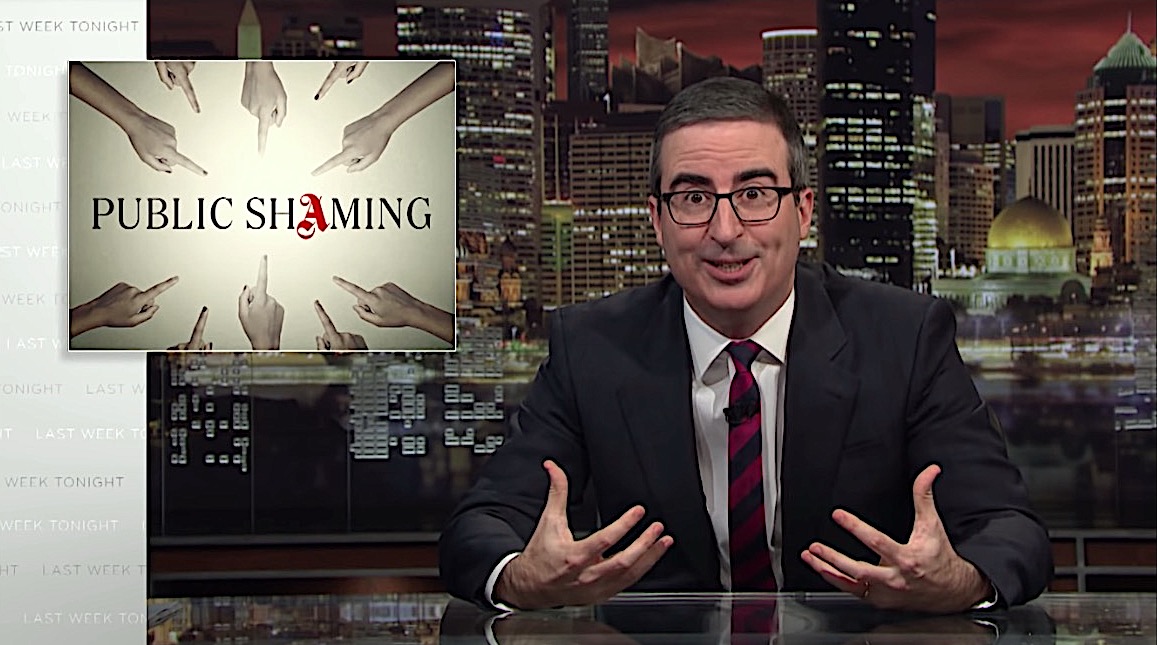John Oliver tries to figure out fair ground rules for public shaming, gets advice from Monica Lewinsky


A free daily email with the biggest news stories of the day – and the best features from TheWeek.com
You are now subscribed
Your newsletter sign-up was successful
"Thanks to the internet, it has never been easier to pile on to a public shaming," John Oliver said on Sunday's Last Week Tonight. "In fact, it's now one of America's favorite pastimes," and "you've probably participated" in this "golden age of internet shaming," he said. "And you may be expecting me to say that all public shaming is bad, but I don't actually think that. When it's well-directed, a lot of good can come out of it."
Oliver held up Fox News host Tucker Carlson as "a good example of an internet pile-on being merited: He's a public figure, he made his comments publicly, they are appalling, and he's standing by them. But clearly it's not always that simple. Because when misdirected, internet pile-ons can completely destroy people's lives," and "often it is not a public figure who's on the receiving end of it."
Oliver and his writers think a lot "about who we make fun of, why we're doing it, and how," he said. For example, it's fine to pile on the parents who allegedly paid serious money to cheat their kids into college, but "it gets more complicated" with their kids. "When millions of people all feel the need to weigh in, and do it potentially for years, the punishment can be vastly disproportionate to the offense," he said. "And perhaps the best example of this is Monica Lewinsky."
The Week
Escape your echo chamber. Get the facts behind the news, plus analysis from multiple perspectives.

Sign up for The Week's Free Newsletters
From our morning news briefing to a weekly Good News Newsletter, get the best of The Week delivered directly to your inbox.
From our morning news briefing to a weekly Good News Newsletter, get the best of The Week delivered directly to your inbox.
To imagine Lewinsky's experience, "think of the dumbest thing you did when you were young — not the dumbest thing you go caught doing," Oliver said. "Now imagine hearing about that every single day for decades on end." Public shaming is complicated, he said, "but Monica Lewinsky might actually be the perfect person to remind all of us what the consequences can be to a misdirected flood of public anger." So he sat down and asked her, and you watch their interview below. (Some of the clip has NSFW language.) Peter Weber

A free daily email with the biggest news stories of the day – and the best features from TheWeek.com
Peter has worked as a news and culture writer and editor at The Week since the site's launch in 2008. He covers politics, world affairs, religion and cultural currents. His journalism career began as a copy editor at a financial newswire and has included editorial positions at The New York Times Magazine, Facts on File, and Oregon State University.
-
 6 exquisite homes with vast acreage
6 exquisite homes with vast acreageFeature Featuring an off-the-grid contemporary home in New Mexico and lakefront farmhouse in Massachusetts
-
 Film reviews: ‘Wuthering Heights,’ ‘Good Luck, Have Fun, Don’t Die,’ and ‘Sirat’
Film reviews: ‘Wuthering Heights,’ ‘Good Luck, Have Fun, Don’t Die,’ and ‘Sirat’Feature An inconvenient love torments a would-be couple, a gonzo time traveler seeks to save humanity from AI, and a father’s desperate search goes deeply sideways
-
 Political cartoons for February 16
Political cartoons for February 16Cartoons Monday’s political cartoons include President's Day, a valentine from the Epstein files, and more
-
 ‘One Battle After Another’ wins Critics Choice honors
‘One Battle After Another’ wins Critics Choice honorsSpeed Read Paul Thomas Anderson’s latest film, which stars Leonardo DiCaprio, won best picture at the 31st Critics Choice Awards
-
 Son arrested over killing of Rob and Michele Reiner
Son arrested over killing of Rob and Michele ReinerSpeed Read Nick, the 32-year-old son of Hollywood director Rob Reiner, has been booked for the murder of his parents
-
 Rob Reiner, wife dead in ‘apparent homicide’
Rob Reiner, wife dead in ‘apparent homicide’speed read The Reiners, found in their Los Angeles home, ‘had injuries consistent with being stabbed’
-
 Hungary’s Krasznahorkai wins Nobel for literature
Hungary’s Krasznahorkai wins Nobel for literatureSpeed Read László Krasznahorkai is the author of acclaimed novels like ‘The Melancholy of Resistance’ and ‘Satantango’
-
 Primatologist Jane Goodall dies at 91
Primatologist Jane Goodall dies at 91Speed Read She rose to fame following her groundbreaking field research with chimpanzees
-
 Florida erases rainbow crosswalk at Pulse nightclub
Florida erases rainbow crosswalk at Pulse nightclubSpeed Read The colorful crosswalk was outside the former LGBTQ nightclub where 49 people were killed in a 2016 shooting
-
 Trump says Smithsonian too focused on slavery's ills
Trump says Smithsonian too focused on slavery's illsSpeed Read The president would prefer the museum to highlight 'success,' 'brightness' and 'the future'
-
 Trump to host Kennedy Honors for Kiss, Stallone
Trump to host Kennedy Honors for Kiss, StalloneSpeed Read Actor Sylvester Stallone and the glam-rock band Kiss were among those named as this year's inductees
